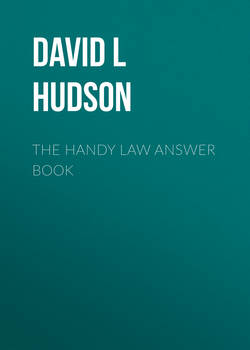Читать книгу The Handy Law Answer Book - David L Hudson - Страница 139
На сайте Литреса книга снята с продажи.
What is the Confrontation Clause?
ОглавлениеThe Confrontation Clause provides that criminal defendants—through their attorneys—have the chance to confront their accusers face-to-face in the courtroom. It means that defense counsel can cross-examine those who make charges and give unfavorable testimony about defendants. In the words of the Supreme Court, the Confrontation Clause “aims to produce fairness by ensuring the reliability of testimony.”
For example, police in the state of Washington charged Michael Crawford with assault and attempted murder after he stabbed a man who earlier had attempted to rape his wife. The wife later gave a tape-recorded statement to the police about the incident. However, at trial Crawford’s wife refused to testify under a spousal exemption under state law that provides that spouses don’t have to give evidence or testify against each other. The prosecution then tried to introduce the tape-recorded statement. Crawford countered that introducing that tape-recorded statement violated the Confrontation Clause, as he would not have an opportunity to cross-examine his wife.
The U.S. Supreme Court unanimously agreed in Crawford v. Washington (2004; see LegalSpeak, p. 71), reasoning that the lower court erred in allowing the wife’s testimonial statement to be introduced when the husband did not have a chance at cross-examination.
LegalSpeak: Taylor v. Louisiana (1975)
The U.S. Supreme Court ruled:
We accept the fair-cross-section requirement as fundamental to the jury trial guaranteed by the Sixth Amendment and are convinced that the requirement has solid foundation. The purpose of a jury is to guard against the exercise of arbitrary power—to make available the common-sense judgment of the community as a hedge against the overzealous or mistaken prosecutor and in preference to the professional or perhaps overconditioned or biased response of a judge. This prophylactic vehicle is not provided if the jury pool is made up of only special segments of the populace or if large, distinctive groups are excluded from the pool. Community participation in the administration of the criminal law, moreover, is not only consistent with our democratic heritage but is also critical to public confidence in the fairness of the criminal justice system. Restricting jury service to only special groups or excluding identifiable segments playing major roles in the community cannot be squared with the constitutional concept of jury trial….
We are also persuaded that the fair-cross-section requirement is violated by the systematic exclusion of women, who in the judicial district involved here amounted to 53% of the citizens eligible for jury service. This conclusion necessarily entails the judgment that women are sufficiently numerous and distinct from men and that if they are systematically eliminated from jury panels, the Sixth Amendment’s fair-cross-section requirement cannot be satisfied.
